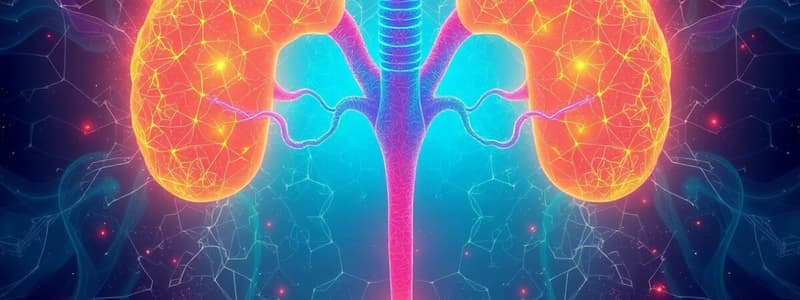Podcast
Questions and Answers
What condition results from a deficiency in thyroid hormone secretion during childhood?
What condition results from a deficiency in thyroid hormone secretion during childhood?
- Hyperactivity
- Stunted growth and mental retardation (correct)
- Obesity
- Increased energy levels
What is the primary hormone secreted by the alpha cells of the pancreatic islets?
What is the primary hormone secreted by the alpha cells of the pancreatic islets?
- Somatostatin
- Insulin
- Adrenaline
- Glucagon (correct)
Which statement about hyperthyroidism is accurate?
Which statement about hyperthyroidism is accurate?
- It is primarily caused by a deficiency of iodine.
- It leads to symptoms such as nervousness and irregular heart rate. (correct)
- It causes an increase in body weight.
- Graves' disease is not a form of hyperthyroidism.
Which of the following best describes Type 1 diabetes?
Which of the following best describes Type 1 diabetes?
What role does parathyroid hormone (PTH) serve in the body?
What role does parathyroid hormone (PTH) serve in the body?
What is the primary function of the adrenal medulla?
What is the primary function of the adrenal medulla?
Which zone of the adrenal cortex is responsible for secreting aldosterone?
Which zone of the adrenal cortex is responsible for secreting aldosterone?
Cushing's syndrome is characterized by excessive production of which hormone?
Cushing's syndrome is characterized by excessive production of which hormone?
What primarily controls the secretion of cortisol and cortisone from the adrenal cortex?
What primarily controls the secretion of cortisol and cortisone from the adrenal cortex?
Addison's disease results from insufficient levels of which hormones?
Addison's disease results from insufficient levels of which hormones?
Which hormone is primarily released by the zona reticularis of the adrenal cortex?
Which hormone is primarily released by the zona reticularis of the adrenal cortex?
What role do opioid peptides like enkephalin play in relation to adrenal hormones?
What role do opioid peptides like enkephalin play in relation to adrenal hormones?
Which of these hormones are secreted by the adrenal cortex?
Which of these hormones are secreted by the adrenal cortex?
What is a key characteristic of the hormones produced by endocrine glands?
What is a key characteristic of the hormones produced by endocrine glands?
Which of the following hormones is classified as a steroid hormone?
Which of the following hormones is classified as a steroid hormone?
What is the primary function of hypothalamic releasing hormones?
What is the primary function of hypothalamic releasing hormones?
How do emotions impact hormone secretion in the body?
How do emotions impact hormone secretion in the body?
Which gland serves as a key player in the hypothalamic-pituitary axis?
Which gland serves as a key player in the hypothalamic-pituitary axis?
What distinguishes non-steroid hormones from steroid hormones?
What distinguishes non-steroid hormones from steroid hormones?
Which of the following is NOT a source of hormone secretion?
Which of the following is NOT a source of hormone secretion?
Which of the following effects describes how hormones generally function within the body?
Which of the following effects describes how hormones generally function within the body?
Flashcards are hidden until you start studying
Study Notes
Adrenal Glands
- Adrenal glands are located at the superior poles of the kidneys.
- Each adrenal gland is composed of two parts: adrenal medulla (20%) and adrenal cortex (80%).
Adrenal Cortex
- Secretes corticosteroids:
- Glucocorticoids: Cortisol, corticosterone
- Mineralocorticoids: Aldosterone
- Zona Glomerulosa: Outermost layer of the adrenal cortex.
- Secretes Aldosterone.
- Controlled by the renin-angiotensin system and plasma potassium levels.
- Zona Faciculata: Middle layer of the adrenal cortex.
- Secretes cortisol, corticosterone and small amounts of adrenal androgens and estrogens.
- Controlled by the hypothalamic-pituitary axis via ACTH.
- Zona Reticularis: Innermost layer of the adrenal cortex.
- secretes adrenal androgens (dehydroepiandrosterone and androstenedione), small amounts of estrogens and glucocorticoids.
- Controlled by ACTH and cortical androgen-stimulating hormone.
Adrenal Medulla
- Secretes non-steroid hormones:
- Epinephrine (adrenaline)
- Norepinephrine (noradrenaline)
- Dopamine
- Also secretes opioid peptides (encephalin) and adrenomedullin.
- Plays a role in metabolism, blood pressure, and heart activity.
- Most circulating norepinephrine comes from noradrenergic nerve endings.
- About half of circulating dopamine comes from sympathetic ganglia.
Disorders of the Adrenal Gland
- Addison's disease: Deficiency in cortisol and aldosterone.
- Leads to low blood glucose levels and low blood sodium levels.
- Symptoms: fatigue, weakness, abdominal pain, weight loss, and bronzed skin.
- Cushing's syndrome: Excess cortisol.
- Symptoms: excessive glucose production from glycogen and protein, retention of salt and water.
Parathyroid Hormone (PTH)
- Controls blood calcium levels
- Effects:
- Removes calcium and phosphate from bone
- Increases calcium absorption in the digestive tract
- Causes kidneys to retain calcium and excrete phosphate.
Pancreas
- Endocrine gland: secretes hormones into the blood.
- Exocrine gland: secretes enzymes, fluids, and ions into the digestive tract.
- Islets of Langerhans: Clusters of endocrine cells scattered throughout the pancreas.
- Alpha cells: Secrete glucagon, which raises blood sugar levels.
- Beta cells: Secrete insulin, which lowers blood sugar levels.
- Delta cells: Secrete somatostatin.
Disorders of the Pancreas - Diabetes
- Type 1 diabetes: Failure of the pancreas to produce enough insulin.
- Insulin-dependent diabetes.
- Autoimmune disorder where the immune system attacks insulin-producing cells.
- Type 2 diabetes: Cells fail to respond adequately to insulin, even when it is present.
- Non-insulin-dependent diabetes.
- May have a genetic component, but lifestyle factors are major determinants.
Endocrine System
- Collection of specialized cells, tissues, and glands.
- Produces and secretes circulating chemical messenger molecules (hormones).
Hormones
- Secreted by endocrine glands.
- Endocrine glands are ductless organs that secrete their products into interstitial fluid, lymph, and blood.
- Exocrine glands: secrete products into ducts.
Characteristics of the Endocrine System
- Hormones reach nearly every living cell.
- Each hormone acts only on certain cells.
- Endocrine control is slower than nervous system control.
- The endocrine and nervous systems interact.
Classification of Hormones
- Steroid hormones: Structurally related to cholesterol, lipid-soluble.
- Non-steroid hormones: Structurally related to proteins, lipid-insoluble.
Learning Objectives
- Discuss the general functions of the endocrine system.
- Classify hormones by their chemical makeup.
- Describe the endocrine functions of the hypothalamus and pituitary.
- Discuss the hormone functions of the pancreas and adrenal glands.
- Describe the hormone functions of the thyroid and parathyroid glands.
- Discuss the hormones produced by reproductive organs.
- Describe other hormone sources and other chemical messengers.
- Discuss various disorders of the endocrine system.
Studying That Suits You
Use AI to generate personalized quizzes and flashcards to suit your learning preferences.





